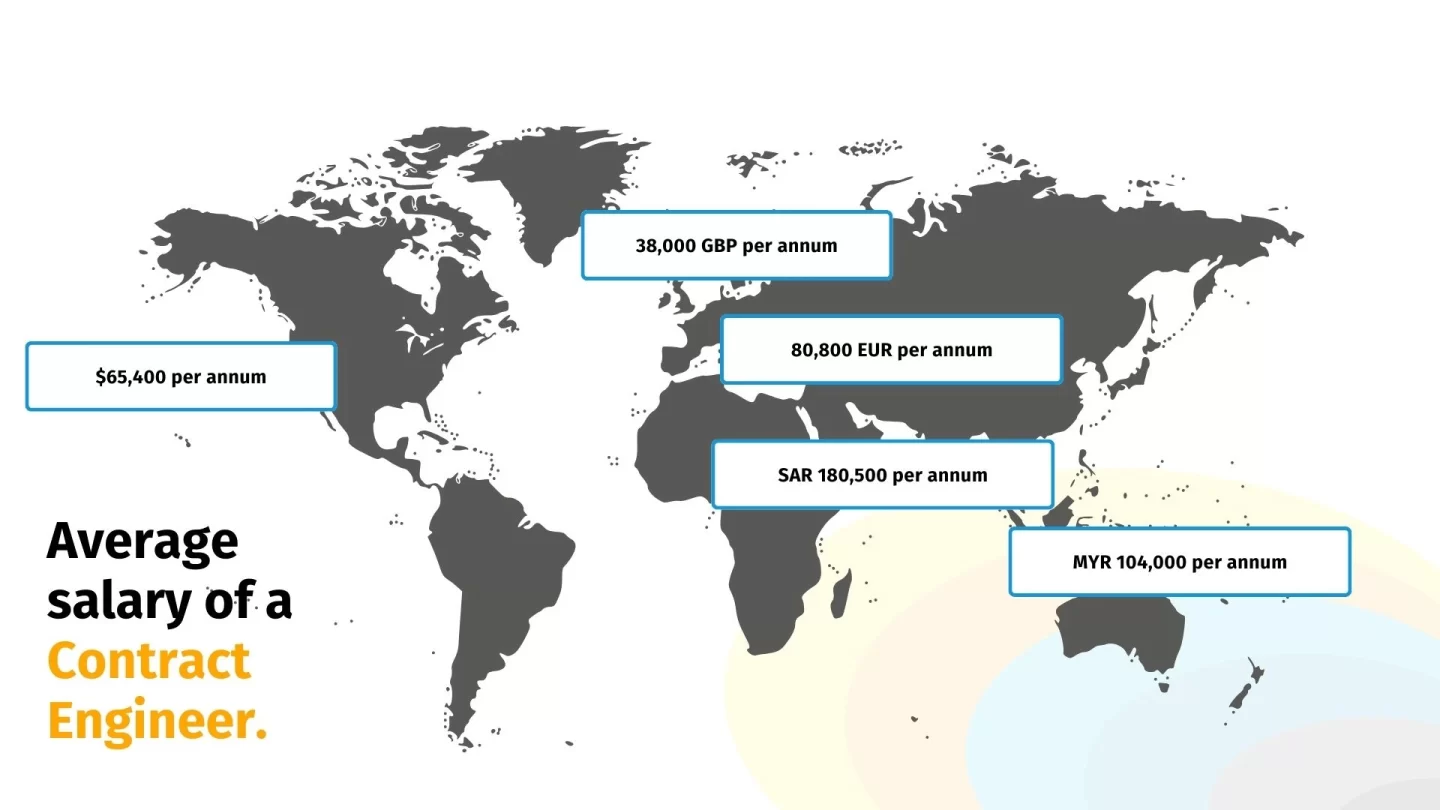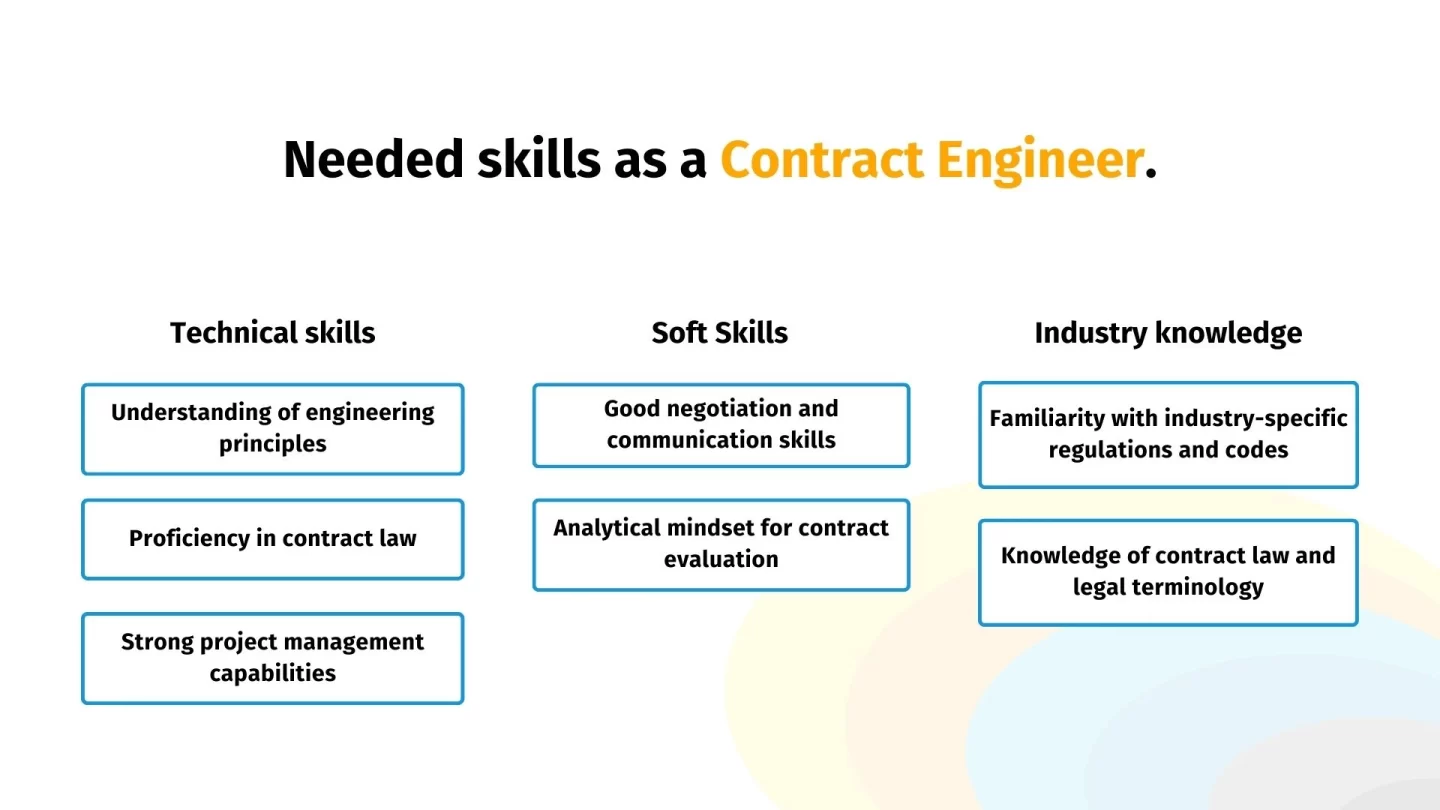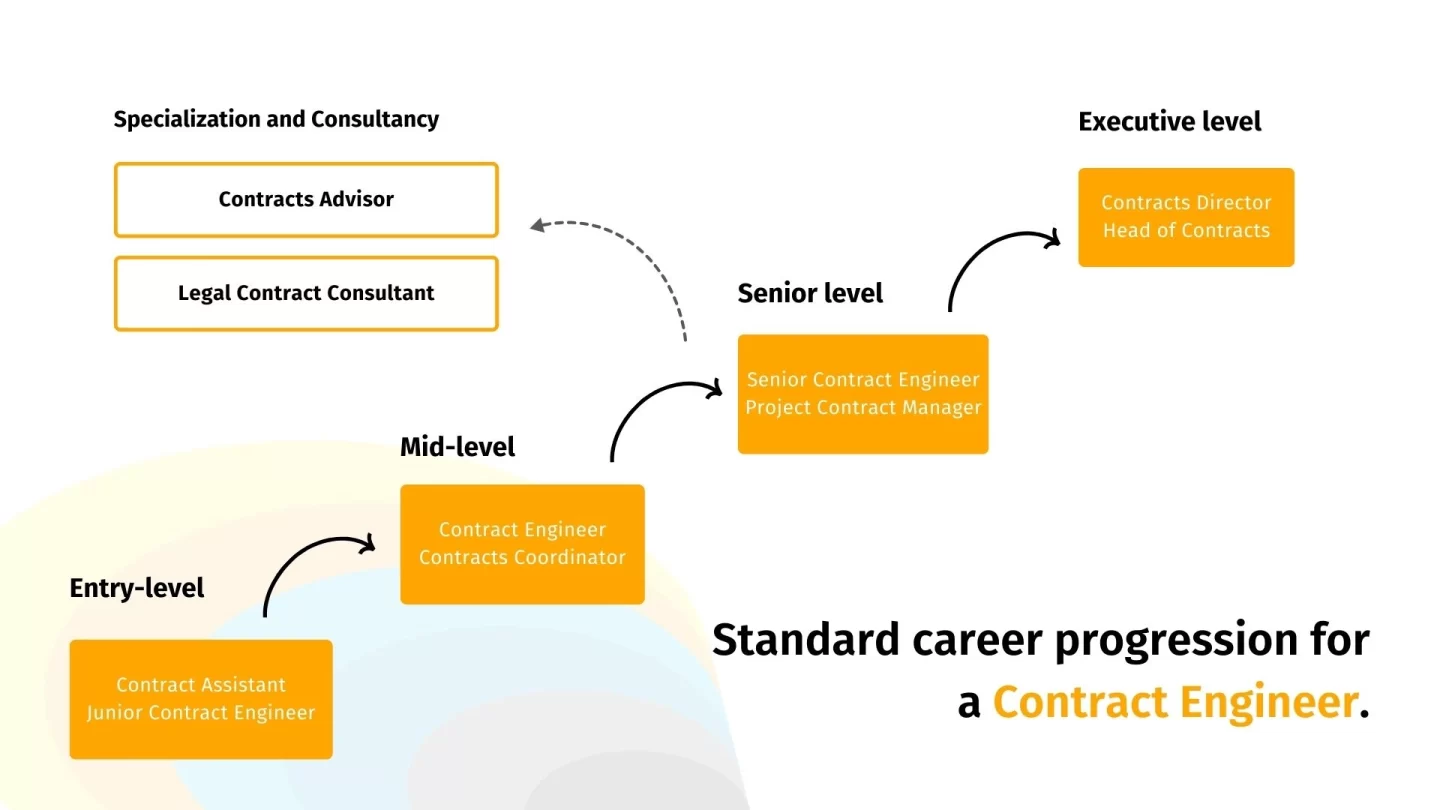As a contract engineer, you play a critical role in ensuring project success by managing contracts, negotiating terms, and aligning with regulatory standards. This position is ideal for detail-oriented individuals who want to make a direct impact on project outcomes in diverse sectors like energy, infrastructure, and technology.
Estimated reading time: 8 minutes
What is a contract engineer?
A contract engineer is a professional who supervises, manages and oversees different stages of the project and are normally specialized in engineering disciplines. Contract engineers make sure that processes within a project are done according to the terms agreed in a fair and safe way.
What does a contract engineer at an energy company do?
Key responsibilities for contract engineers in the energy industry include:
- Administrative Functions: Data collection, analysis, and detailed research.
- Financial Management: Setting financial parameters, drafting bids, and managing budgets.
- Compliance and Documentation: Organizing records, overseeing contract execution, and ensuring all legal requirements are met.
- Problem-Solving: Addressing any contract-related issues efficiently to maintain project momentum.
Salary and benefits

As shown by data collected in October 2024.
The salary and benefits for a contract engineer can vary widely depending on several factors such as the industry, geographic location, level of experience, and the specific nature of the contract.
The average salary of a contract engineer in the United States is around $65,400 per year. In comparison, the salary in the Netherlands is around EUR 80,800 annually. In the United Kingdom, , the average salary is around £38,000 per year. Saudi Arabia, on the other hand, offers its contract engineers an average annual wage of SAR 180,500 while in Malaysia, it is around MYR 104,000 annually.
One benefit that comes with their role is the diversity in responsibilities. This allows for broad professional development and the acquisition of a versatile skill set that can be valuable in various industries. Additionally, given the critical nature of contract management in projects, especially in sectors like construction, technology, and engineering, professionals with this expertise are in high demand. This demand can offer job flexibility in terms of contract duration, choice of projects, and even freelance opportunities.
Some other benefits come with the specialized nature of their skills and the critical role they play in the success of projects, contract engineers often command competitive salaries. They may also negotiate higher rates based on the complexity and duration of the project.
Contract engineer skills and requirements
A contract engineer must possess a diverse set of skills and qualifications to manage complex projects effectively. Educationally, they typically hold a bachelor’s degree in an engineering field, supplemented by certifications in project or contracts management, such as PMP or CPCM. Their technical skills should include a solid understanding of engineering principles, proficiency in contract law, and adept project management capabilities.
Key soft skills include excellent communication for negotiating and liaising with various stakeholders, analytical thinking for problem-solving, and meticulous attention to detail to oversee contract specifics. Experience in the relevant industry and in managing contracts is highly beneficial.
Additionally, contract engineers need to be adaptable, continuously updating their knowledge to keep pace with industry changes, and able to manage the risks and legal aspects associated with large-scale projects effectively.

Responsibilities of a contract engineer
Contract engineers play a vital role in the success of construction and large-scale projects. Their responsibilities include:
Ensuring compliance with contract terms and conditions
Managing financial tasks such as billing and payment collection
Identifying risks and implementing mitigation strategies
Handling claims, variations, and documenting project changes
Preparing for dispute resolution and managing conflicts effectively
Drafting contractual communications as authorized by project management
Locations of contract engineer jobs
Contract engineer jobs are available across a wide range of industries and locations, reflecting the diverse needs for project-based engineering expertise. In urban centers and industrial hubs there is a higher concentration of these positions. This is due to the volume of commercial and infrastructure projects. These roles are also prevalent in areas with significant construction, manufacturing, or technology sectors. Globally, countries with rapidly expanding infrastructure like China, India, and the UAE also offer numerous opportunities for contract engineers.
Regions rich in natural resources such as oil, gas, and minerals—like Texas in the USA, Alberta in Canada, and Western Australia—frequently require contract engineers for energy and mining projects. As businesses increasingly adopt project-based structures and flexible employment practices, the availability of contract engineering positions continues to grow. This offers roles in both traditional and emerging industries worldwide.
Challenges in contract engineering
The role of contract engineering comes with its own set of challenges such as:
Job security
Projects are temporary, leading to potential employment gaps and continuous job searching.
Heavy workload
Managing extensive administrative tasks, including budgeting and documentation, requires precise attention and effective time management.
Complex negotiations
Balancing contract terms, client expectations, and project execution while addressing variations can be demanding.
Client relations
Maintaining strong stakeholder relationships is essential, especially when navigating disputes or challenges.
Career progression and growth opportunities

A career as a Contract Engineer often begins with entry-level positions like Contract Assistant or Junior Contract Engineer. In these roles, professionals familiarize themselves with the fundamentals of contract law, project documentation, and administrative responsibilities. This stage helps them build a strong foundation in project compliance and regulatory standards.
As they gain experience, individuals move into mid-level roles, such as Contract Engineer or Contracts Coordinator, where they take on greater responsibility in drafting contracts, managing contract terms, and ensuring project timelines are met. These positions involve close collaboration with project teams and require a keen understanding of both technical and legal frameworks.
Progressing further, professionals may step into senior positions like Senior Contract Engineer or Project Contract Manager, overseeing multiple projects, managing negotiations, and handling disputes. At this level, leadership and problem-solving skills become essential as they guide junior staff and manage complex contract scenarios.
For those interested in specializing or consulting, paths such as Contracts Advisor or Legal Contract Consultant offer the chance to focus on contract strategy and high-level client advising. Executive-level roles, including Contracts Director or Head of Contracts, provide the opportunity to shape contract policies, oversee major projects, and lead teams across the organization.
Work environment and culture
Typically, these professionals work in fast-paced settings where precision and compliance are paramount. Many contract engineers work in offices, though their tasks might also take them to project sites or manufacturing facilities if their work involves overseeing certain aspects of contract execution.
Collaboration is often a key element of the culture. Contract engineers need to coordinate with various departments to ensure that contracts are accurate and beneficial.
How to Become a contract engineer in the Energy Industry
To become a contract engineer in the energy industry, you’ll need to follow a specific set of steps to gain the necessary skills and qualifications. First, pursuing a relevant educational background is essential. Typically, a bachelor’s degree in engineering, such as electrical, mechanical, or chemical engineering, is required. Specializing in energy systems or renewable energy can be particularly beneficial given the sector’s focus.
Gaining industry-specific experience is crucial. This can be achieved through internships or entry-level positions in energy companies. Here, you can learn about industry standards, project management, and contract specifics. Understanding the technical and regulatory aspects of energy projects will be particularly valuable.
Additionally, obtaining certifications related to project or contract management, like the Project Management Professional (PMP) or Certified Professional Contract Manager (CPCM), can enhance your credentials and appeal to potential employers.
Benefits of working a contract engineer
- Diverse project experience – Contract engineers gain exposure to a variety of projects across different industries, enhancing their skills and adaptability.
- Higher pay rates – Due to the temporary nature and demand for specialized skills, contract engineers often earn higher wages than permanent employees.
- Flexible terms – Contracts can be negotiated for better working conditions, such as higher pay or flexible schedules.
- Skill enhancement – Working on diverse projects helps build a versatile skill set, making contract engineers more marketable.
Drawbacks
While working as a contract engineer offers numerous benefits, there are also several drawbacks to consider:
- Job insecurity – Contracts are fixed-term, leading to potential unemployment between projects and financial instability.
- Stress from uncertainty – The need to constantly find new projects can be stressful without guaranteed future work.

Current Jobs
Looking for jobs in the energy sector? WTS Energy is always looking for talented project managers to fill roles in oil, gas, and renewable energy companies worldwide. Explore our current job openings on our career page and take the next step in your career today!
